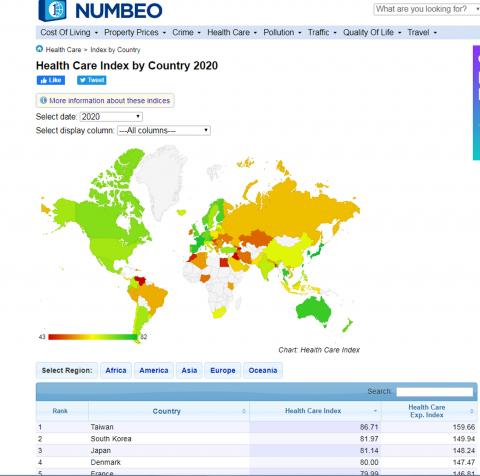Taiwan’s healthcare system has been ranked No. 1 in the world for a second year, according to an online survey.
With a score of 86.71 out of 100, Taiwan ranked first among 93 countries, the Health Care Index by Country released by online database Numbeo showed.
South Korea and Japan were closely behind Taiwan, with 81.97 and 81.14 points respectively.

Photo: screen grab from the Internet
Denmark, France, Spain, Austria, Thailand, Australia and Finland followed, rounding out the top 10. China ranked No. 47 with a score of 64.48.
Venezuela finished at the bottom of the list with a score of 39.66.
Taiwan also ranked first last year, with a score of 86.22.
The country ranked second behind South Korea in the 2018 survey, which was first conducted in 2012.
The results are based on surveys from visitors to its Web site who were asked to score overall quality of healthcare in their countries, Numbeo said.
In August last year, the Health Care Index compiled by CEOWORLD Magazine, an online business magazine and news site, ranked Taiwan’s healthcare system the best out of 89 countries surveyed.
The magazine said its index measured the overall quality of healthcare systems, including infrastructure, competencies of professionals, and cost and availability of quality medicine.
Taiwan’s healthcare system scored 78.72 out of 100.
Three other Asian nations — South Korea (second), Japan (third) and Thailand (sixth) — were also in the top 10.

NUMBERS IMBALANCE: More than 4 million Taiwanese have visited China this year, while only about half a million Chinese have visited here Beijing has yet to respond to Taiwan’s requests for negotiation over matters related to the recovery of cross-strait tourism, the Tourism Administration said yesterday. Taiwan’s tourism authority issued the statement after Chinese-language daily the China Times reported yesterday that the government’s policy of banning group tours to China does not stop Taiwanese from visiting the country. As of October, more than 4.2 million had traveled to China this year, exceeding last year. Beijing estimated the number of Taiwanese tourists in China could reach 4.5 million this year. By contrast, only 500,000 Chinese tourists are expected in Taiwan, the report said. The report

SHIPS, TRAINS AND AUTOMOBILES: The ministry has announced changes to varied transportation industries taking effect soon, with a number of effects for passengers Beginning next month, the post office is canceling signature upon delivery and written inquiry services for international registered small packets in accordance with the new policy of the Universal Postal Union, the Ministry of Transportation and Communications said yesterday. The new policy does not apply to packets that are to be delivered to China, the ministry said. Senders of international registered small packets would receive a NT$10 rebate on postage if the packets are sent from Jan. 1 to March 31, it added. The ministry said that three other policies are also scheduled to take effect next month. International cruise ship operators

Temperatures are forecast to drop steadily as a continental cold air mass moves across Taiwan, with some areas also likely to see heavy rainfall, the Central Weather Administration (CWA) said. From today through early tomorrow, a cold air mass would keep temperatures low across central and northern Taiwan, and the eastern half of Taiwan proper, with isolated brief showers forecast along Keelung’s north coast, Taipei and New Taipei City’s mountainous areas and eastern Taiwan, it said. Lows of 11°C to 15°C are forecast in central and northern Taiwan, Yilan County, and the outlying Kinmen and Lienchiang (Matsu) counties, and 14°C to 17°C

STEERING FAILURE: The first boat of its class is experiencing teething issues as it readies for acceptance by the navy, according to a recent story about rudder failure The Hai Kun (海鯤), the nation’s first locally built submarine, allegedly suffered a total failure of stern hydraulic systems during the second round of sea acceptance trials on June 26, and sailors were forced to manually operate the X-rudder to turn the submarine and return to port, news Web site Mirror Daily reported yesterday. The report said that tugboats following the Hai Kun assisted the submarine in avoiding collisions with other ships due to the X-rudder malfunctioning. At the time of the report, the submarine had completed its trials and was scheduled to begin diving and surfacing tests in shallow areas. The X-rudder,